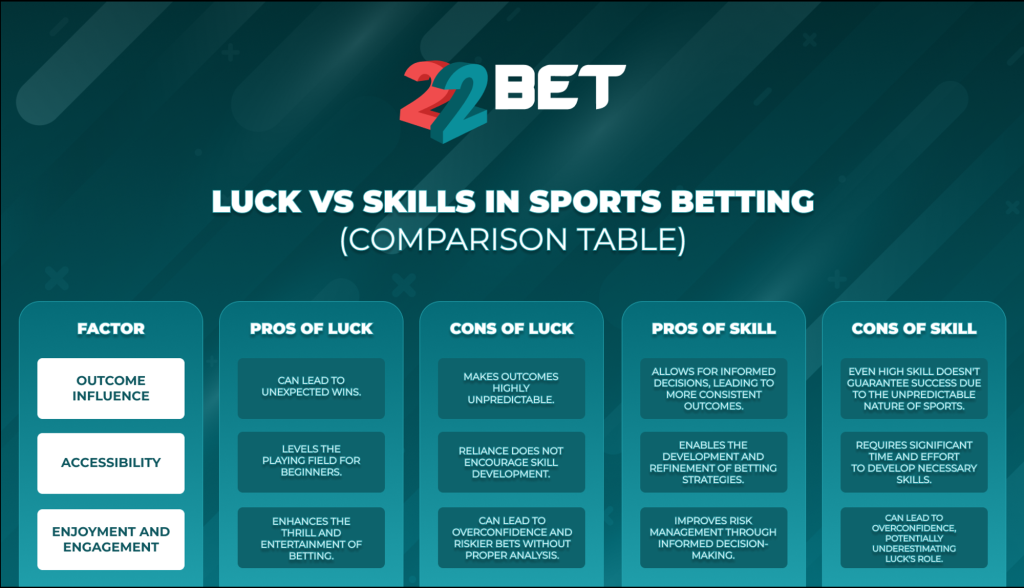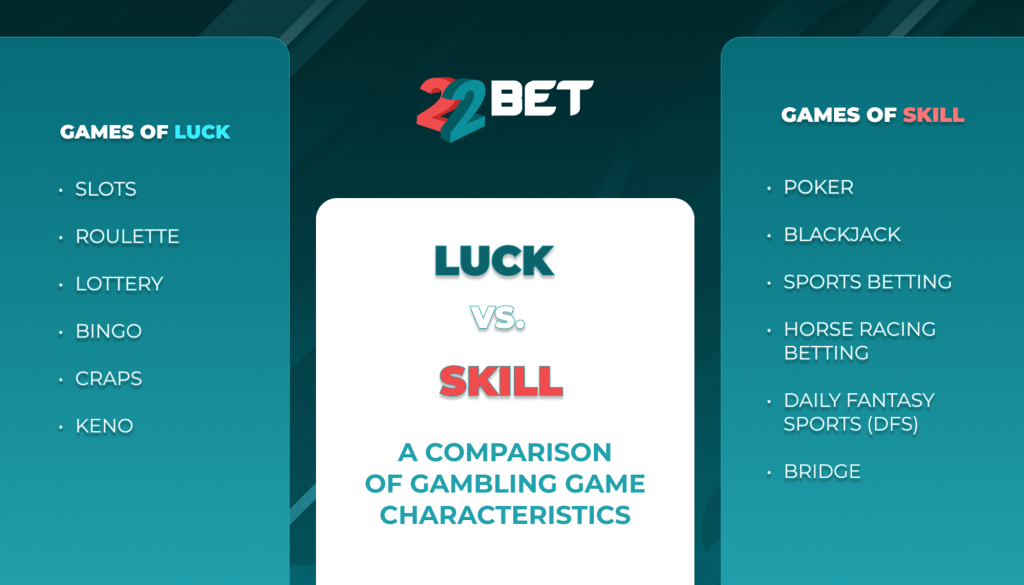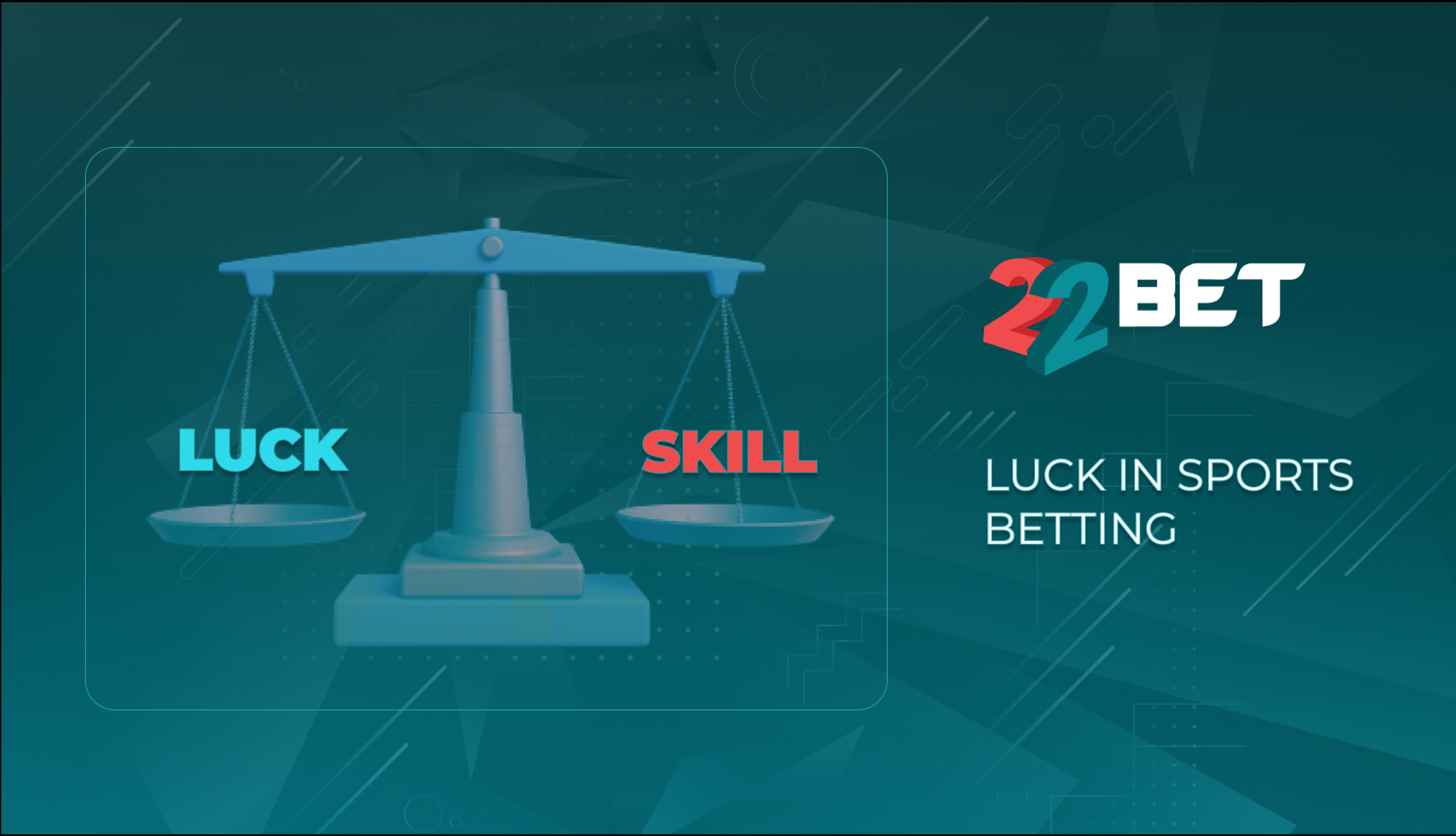Oftentimes, we might ask ourselves, is sports betting skill or luck? Sports betting is plenty of skill, but luck certainly plays a role in betting. Factors like injuries, weather conditions, and player mistakes can completely alter the outcome of our bets. While we never have any influence on how a game ends, we can put our best ability forward and try to do everything we can to understand the game before we bet on it. In this article, we will explore the role of luck in sports betting and explore what we can do to reduce the risks.
Debate of Luck vs. Skill in Sports Betting
There isn’t much of a debate when it comes to luck vs. skill in sports betting. If you ask if sports betting is all luck, the answer would be no. There are many factors that we can control, and while we can’t influence the outcome of a game, we can do everything we need to put ourselves in the best positions to win.
Even when applying strategic betting skills, winning is never guaranteed, especially in unpredictable arenas like MLB luck betting and CSGO luck betting. Despite the challenges posed by these sports, we can apply many of the same skills that we use in other forms of sports betting to these fields and try to win.
Skillful bettors can analyze past performances, odds, teams, and more. If they do that, they often combine their knowledge to make profitable bets and, with luck on their side, can possibly make even more money.
The Nature of Sports Betting
The beauty of sports betting is that it does take luck and skill. However,
Legal betting requires more skill than luck. It’s one of those unique things where luck is involved, but there are also factors that we can control. If we have successful sports betting models, they could play a role in us potentially becoming profitable.
There are certain games where luck just isn’t on our side.
We will need any possible break to win some of our bets. For example, when the Kansas City Chiefs won the Super Bowl two seasons ago, there was a holding call in the last minute of the game, which allowed them to get a free first down and ended up being the deciding factor in the game. If the referee hadn’t decided to call that, Kansas City might’ve lost the game. Although it was a penalty, there was luck for Chiefs bettors in that scenario.
When someone bets on the Super Bowl, make sure to learn how to wish someone luck when betting, as in a prestigious final like that, anything can happen.
Understanding the Dynamics of Predicting Game Outcomes
When we predict game outcomes in sports betting, we have to combine skillful analysis and inherent unpredictability.
We can only bet on the known when we try to predict game outcomes. Certain statistical data points, such as past trends, historical performance, and weather conditions, can inform our decisions.
However, we can’t factor in what will happen in terms of sudden injuries or unexpected weather changes.
So, we try to leverage statistical insights to make well-informed predictions. But with the unpredictable nature of sports, we must realize that luck will always play a role.
Role of Luck in Sports Betting: Diving Deep Into the Unpredictability and Volatile Nature of Sports

This image delineates the advantages and disadvantages of relying on luck versus skill in the context of betting. Under “Outcome Influence,” luck can provide unexpected victories but results in unpredictable outcomes, whereas skill allows for informed decisions that can lead to more consistent results, though it doesn’t eliminate the unpredictable nature of sports. “Accessibility” highlights that luck gives beginners an equal chance but discourages skill development, while skill-based betting encourages strategy development but requires significant effort. Lastly, “Enjoyment and Engagement” show that luck can increase the excitement of betting but may lead to overconfidence and riskier decisions without analysis. Skill improves risk management through informed choices but can also lead to overconfidence, underestimating the role of luck.
There are many scenarios of luck and bad luck in sports betting. When it comes to luck, oftentimes, people feel like they’re on the opposite side of it. However, that’s not always the case. There can be luck involved throughout the entire game.
For example, when the Houston Rockets played the Golden State Warriors in the NBA Playoffs a few seasons ago, and they couldn’t make a three-point shot, there was luck all throughout that game for people who bet on the Warriors.
On the flip side, there was massive bad luck in sports betting for people who bet on the Rockets. If you bet on a sport and something lucky happens, you’re either the unlucky person or the lucky person.
We have to deal with the role of luck when it comes to sports. With all the possible outcomes in some of these games, as these are some of the top athletes in the world, anything can happen.
Case Studies or Examples Where Luck Played a Pivotal Role in Betting Outcomes
Case studies don’t show any luck in sports betting, but other examples exist. Daily studies can show some of the luckiest wins ever. Some of those include missed layups at the buzzer in basketball, empty net goals, and football players running out of bounds before scoring.
Role of Skill in Sports Betting: How Research, Strategy, and Experience Contribute to Better Betting Decisions
When we talk about skill in sports betting, we mean reducing the impact of luck through informed decisions. When you think I have the worst luck betting, it is probably not your luck but a lack of strategic betting.
Some key strategies for more success in your betting include:
- Building a bankroll
- Creating a betting model
- Analyzing data
- Finding trends
If we use these strategies, we can sometimes be profitable. Doing as much research as possible can often eliminate the luck of sports betting, although that is not always the case.
Tools and Techniques Used by Experienced Bettors to Minimize Reliance on Luck
Experienced bettors use tools and techniques to minimize reliance on luck, which include:
- Apply past trends: Analyze historical data to forecast future performances.
- Use betting models: Integrate models designed to asses risk and identify value bets.
- Bankroll management: Adopt techniques to grow your bankroll, such as disciplined risk management and maintaining consistent unit sizes. Hedging bets to protect against losses also does wonders for your bankroll.
Comparing Sports Betting With Casino Games: Understanding the Luck and Skill Spectrum

This picture categorizes popular gambling activities into two main types: Games of Luck and Games of Skill. Games of Luck include casino favorites like Slots, Roulette, Lottery, Bingo, Craps, and Keno, where outcomes are primarily determined by chance. On the other hand, Games of Skill involve more strategic play and include Poker, Blackjack, Sports Betting, Horse Racing Betting, Daily Fantasy Sports (DFS), and Bridge, where players’ decisions significantly influence the results.
In sports betting, our wagers are somewhat balanced by the interplay of luck and strategy. In contrast, our influence over casino games is considerably more limited.
Casino games are defined by the Return to Player (RTP) rate, which indicates the percentage of wagered money a game will pay back to players over time.
For example, one with over 92% would be considered favourable, as it suggests a higher portion of the total amount bet by players will be returned as winnings for a game.
However, sports betting requires a more analytical approach than simply clicking a button and watching the slots in a casino game.
We need to consider numerous factors, including statistical data, which helps to mitigate the role of luck that is predominant in casino gaming.
How Different Gambling Activities Rank on the Luck vs. Skill Scale
Certain gambling activities rank lower or higher on the luck versus skill scale.
For example, if you bet on a moneyline, you’d take slightly less risk than spread betting. This is due to the more straightforward decision-making process.
Some of the riskier sports bets include betting on parlays and teasers due to their complex nature. Conversely, moneyline and spread bets are generally considered easier and less risky options.
We have to understand that if we’re betting on 10-leg wagers, there will be a level of luck that’s required, no matter the amount of data that backs up the bet.
The Professional Bettor: Luck or Skill?
Is sports betting luck or skill for professionals? The reality is that even for a professional bettor, there’s luck involved. No matter the type of data that’s provided, sports betting can still come down to luck.
A professional bettor can’t predict an injury or a player playing way below their usual averages. In fantasy sports betting, luck and skill go hand in hand with most professional bettors. They have all of the skills in the world, but luck is still needed on their side to win wagers at times.
Analyzing the Traits and Strategies of Professional Bettors
Professional bettors possess certain traits and strategies that allow them to navigate the volatile waters of sports betting. Even when their betting hits a bad luck streak,they stick to their minds.
This poses the question: Is sports betting all luck? Of course not, but that’s because of certain key factors that can help, which include:
- Sticking to a bankroll: To help mitigate the impact of losses, professional bettors set up a bankroll, which is a predetermined amount of money dedicated to betting.
- Avoid chasing losses: The discipline of resisting to bet more to try to recover from previous losses.
- Using stats: With statistical analysis, you can minimize the role of luck in your betting decisions.
How Pros Manage and Mitigate the Role of Luck in Their Bets.
Pros try to minimize the influence of luck by focusing more on analysis than relying on the unpredictable nature of betting luck. By using statistical data and trends they reduce the role of chance in their decisions.
When asking professional bettors whether betting is luck or skill, they would always choose skill, as they see betting as an analytical and disciplined activity.
The Pinnacle Study: Analyzing Betting as a Skill
The Pinnacle study analyzes betting as a skill even before they place their first bet. The study suggests that certain professions can lead to being a better bettor. An actuary is believed to be a bookmaker in disguise, according to Pinnacle.
“From predicting your life expectancy to measuring how good a driver you are, the job of an Actuary is to compile and analyze statistics in order to calculate insurance risks – home, car, life, medical etc – and work out what premiums to charge in order to run a profitable insurance business. That job spec is going to sound very familiar to an odds-compiler at a bookmaker, the only real difference is the context.”
The idea is that they do similar things, but sports betting is just a different field. The same could be said for a financial trader who should see betting as an asset class.
Embracing Both Facets: How to Balance Luck and Skill
Embracing both luck and skill is what needs to be done when you want to become successful in betting. It takes years of experience to understand that we can’t dictate the outcome of a game. Whether we win or lose, we have to embrace how to balance luck and skill.
By doing that, we stick to our safe gambling strategy and do everything needed to try to win long-term. Understanding the importance of luck helps us with the challenge of achieving consistent wins. At the same time, skill helps us to make more informed wagers and improve our chances of success. Don’t just test your luck betting, but also learn the skills.
Strategies to Optimize Betting Decisions Considering Both Luck and Skill
Effective strategies to balance luck and skill could include the following:
- Stick with your betting strategies: Follow strategies that are based on statistical analysis and well-informed insights. This also goes for your bankroll management.
- Accepting unpredictability: Accepting the randomness of sports betting helps you get ready for outcomes that are beyond statistical analysis.
- Improve quick decision-making: When you can quickly interpret data and adjust your bets based on that, you will have an edge.
- Use statistical analysis: Decisions based on stats enable you to make informed bets, reducing the role of luck in your betting. Understanding betting against luck will avoid making decisions without cracking the numbers first.
The Importance of Continuous Learning and Adapting in the Betting World
It’s always important to continue learning in the sports betting world. With all the trends out there, always try to find the emerging ones. If we don’t keep up with the latest sports betting techniques, we can find ourselves in a bad position.
The people who overlook or disregard this new data are likely to fall behind on those who do use it. Given all the chances that we have to make money, the importance of continuous learning and adapting in this betting world is second to none.
Conclusion
While sports betting does seem tough at times, and the luck factor can worry people, always be encouraged that you can easily find the right techniques and tools to achieve success.
It doesn’t matter how much luck is involved in this, if you stick to what works for you and find a profitable strategy, you should be able to win long term. It’s not easy, but we can avoid luck as much as we can if we do everything we discussed above.

















